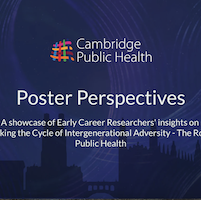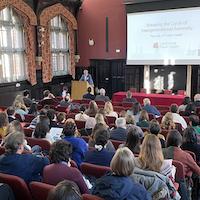Intergenerational adversity refers to the cascading effect of challenges, such as mental ill health and poverty, passed down through families and communities with impacts on the wellbeing, opportunities, and outcomes of future generations.
To break these cycles, it’s essential to adopt a public health approach that focuses on addressing the root causes and transmission mechanisms of intergenerational challenges, and identify effective interventions and policies that promote population health and wellbeing.
As researchers, we need to recognise that intergenerational adversity is not limited to any specific area of research, but rather applies to specialisms across the health and human sciences.
This page brings together work on this topic from across CPH research pillars and themes.
Cambridge Public Health Showcase 2023
On 7 November, 2023, Cambridge Public Health held its annual showcase on this research topic. We were honoured to have four distinguished keynote speakers at the event, bringing with them a wealth of knowledge and a diverse range of perspectives on how we can move forwards.
Watch the recordings of the keynote presentations here.
Poster Gallery
 Our poster gallery features a vibrant collection of informative and engaging posters created by early career researchers at the University of Cambridge.
Our poster gallery features a vibrant collection of informative and engaging posters created by early career researchers at the University of Cambridge.
The posters loosely centre around the theme of 'Breaking the Cycle of Intergenerational Adversity - the role of public health'. Originally presented at the Cambridge Public Health Showcase, these posters were part of a competition that attracted almost 50 submissions from across the university.
Joint workshop with the Centre for Science and Policy (CSaP)
 Breaking the cycle of intergeneration adversity was the theme of a workshop jointly organised between CSaP and Cambridge Public Health in July 2023. The workshop brought together policymakers, leading academic experts, as well as other relevant stakeholders, to address key public health policy challenges in this space and develop a set of recommendations aimed at improving population health.
Breaking the cycle of intergeneration adversity was the theme of a workshop jointly organised between CSaP and Cambridge Public Health in July 2023. The workshop brought together policymakers, leading academic experts, as well as other relevant stakeholders, to address key public health policy challenges in this space and develop a set of recommendations aimed at improving population health.
A summary report of the workshop is available here.




